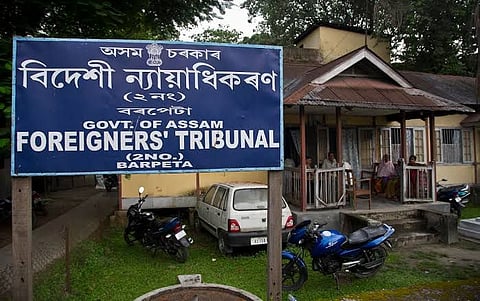
- Home
- Live Blog
- Breaking News
- Top Headlines
- Cities
- NE News
- Sentinel Media
- Sports
- Education
- Jobs

Guwahati: In a decisive move aimed at tightening the state’s immigration control, the Assam government has empowered Foreigners Tribunals (FTs) to directly order the detention of individuals declared as illegal immigrants. This new directive, issued through a state notification, marks a pivotal change in how Assam enforces its citizenship laws.
Until now, Foreigners Tribunals could only determine an individual's citizenship status. Once a person was declared a foreigner, the decision to detain rested with district magistrates or police authorities. The updated mandate eliminates that extra step—enabling tribunals to not only pass judgment but also to initiate detention immediately.
"This move is about efficiency and enforcement," said a senior state official. "Delays in detaining declared foreigners have allowed many to disappear or go underground. This change plugs that gap."
Strengthening the Enforcement Chain
Assam is home to over 100 active Foreigners Tribunals—quasi-judicial bodies established under the Foreigners Act, 1946. They play a crucial role in identifying undocumented migrants, particularly from Bangladesh, a long-standing and sensitive issue in the state.
The new authority granted to these tribunals is expected to streamline the deportation process, although actual deportations remain rare due to diplomatic and logistical hurdles.
"We have often seen tribunal verdicts not acted upon for months," said retired bureaucrat Hemanta Kalita. "Giving tribunals detention powers is an administrative shortcut, but it must be balanced with accountability."
Raising Eyebrows and Alarms
The move has already stirred debate. Legal experts and human rights activists have expressed concern about the potential for misuse, particularly in cases where individuals have been wrongly identified as foreigners due to documentation errors or lack of legal support.
"Tribunals are not full courts, yet they are being given powers with serious implications for liberty," said Paromita Das, a human rights advocate based in Guwahati. "Without safeguards, this could lead to innocent people ending up in detention centres."
On the other hand, supporters of the decision argue it is long overdue.
“Assam has carried the burden of illegal immigration for decades,” said Bikram Nath, spokesperson for a regional nationalist group. “Granting detention powers to tribunals ensures that their rulings are not just symbolic.”
Logistical and Legal Challenges Ahead
As of now, Assam operates six detention centres for illegal immigrants, with plans underway to build more. But critics point out that increasing detentions without a comprehensive review or appeal mechanism could overwhelm the system.
There are also questions about the fate of those detained. Since India and Bangladesh do not have a formal deportation agreement for such individuals, many detainees end up languishing in centres for years without resolution.
With over 19 lakh people excluded from the controversial National Register of Citizens (NRC) in 2019—many of whom are still awaiting tribunal hearings—this policy shift could affect thousands in the coming years.
By arming Foreigners Tribunals with detention powers, the Assam government has taken a bold step in its crackdown on undocumented immigration. Whether this leads to more effective enforcement or sparks fresh legal and humanitarian concerns remains to be seen. What is certain, however, is that Assam's citizenship debate is entering a new and potentially more contentious phase.
Also Watch: